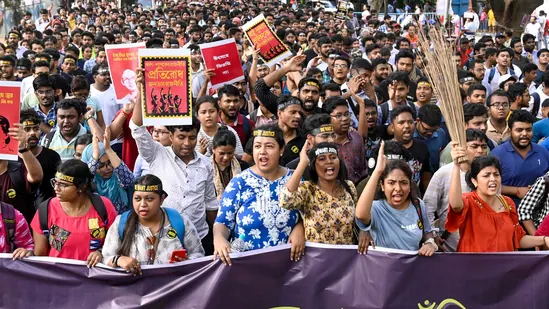
The Kolkata murder case: Nothing ever changes
By Reyam Jamaleddine, September 13 2024—
Trigger warning: Assault, Violence
On Aug. 9, 2024, a 31-year-old woman was resting in a seminar room in Kolkata, India, after a 36-hour shift as a junior doctor in a hospital. The morning after, her body was found partially clothed and she was sexually assaulted and murdered. Her case was immediately deemed to be a suicide by the hospital and police, yet soon after it became blatantly obvious that this was far from the truth. This crime sparked outrage not only in the city of Kolkata but across India and the world. In response, police involvement has pushed for substantial answers regarding this case.
Even amid the unrest of waging wars around the world, hospitals are considered to be safe zones and implemented as such by humanitarian law. Yet, it seems as if no law can be robust enough to protect and create a safe haven for women and girls.
However, there are some laws that exist with the guise of protecting women but the result of confining and controlling their lives. This manifests in the forms of imposing rigid curfews on young girls and women, limiting access to public spaces without guardianship and withdrawing women from equality and freedom in society. Through this restrictive lens, this desperation protects women through fear and defense, rather than outrage and offense against predatory individuals, such as the attacker in the Kolkata murder case—confinement over change, every single time.
In the aftermath of a shocking yet familiar tragedy, educating young girls and women on protecting themselves seems eerily purposeless. After all, what self-defence move can protect from systematic brutality against women? In the same vein, educating young boys and men about sex and their capability of causing brutalities is eerily non-existent. It is a reality that South Asian and women altogether know all too well.
Ceteris Paribus, nothing changes.
And as always, reading of this news may catch the attention of a few and spark conversations amongst the many about how this event is tragic and sad. Yet quickly thereafter, the conversation loses potency and the tragedy is forgotten until another flashy headline. Yet, for perhaps the slight eye this case is different because this case does not bring a new or special method of brutality. It is not mutually exclusive in the midst of violence against women in India or across the globe; in reality, this case carries no new qualities at all. Perhaps, it is the comfortability and familiarity of the Kolkata murder case that has ultimately led into a shift where this is not deemed to be normal any longer. It could be that instead of accepting the news we seek to one day change the news, enough so that women can be safe enough and no longer expect to be headlines whilst six-feet underground bruised and battered.
So what exactly is it that we can do? Tangible change and difference is not so easy to achieve especially in the short-term. Being loud and expressive seems to have exhausted its effectiveness. Ongoing in India and surrounding regions are nightly protests that have persevered and are yet to be exhausted one month after the crime. Change happens in numbers and voices are amplified by the masses in the face of systemic oppression.
Not convinced? The Social Change Lab conducted research on whether or not protests are actually effective in enforcing change. What they found was that there are three main factors that boost the effectiveness of protesting which are: Nonviolent tactics, favourable sociopolitical context and large numbers of participants. Essentially, voices in the masses without violence or irrelevance can tilt the scales in our favour. Regardless of this being an international case, our voices here matter and do create impact. No promises made, but one day, there will be change.
